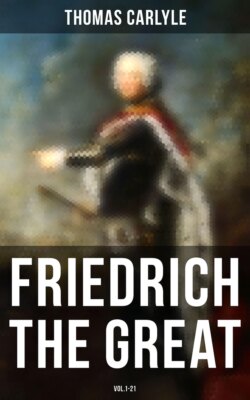Читать книгу Friedrich the Great (Vol.1-21) - Томас Карлейль - Страница 135
На сайте Литреса книга снята с продажи.
Chapter V. — CROWN-PRINCE GOES INTO THE POTSDAM GUARDS.
ОглавлениеTable of Contents
Amid such commotion of the foreign elements and the domestic, an important change occurs in the Crown-Prince's course of schooling. It is decided that, whatever be his progress in the speculative branches, it is time he should go into the Army, and practically learn soldiering. In his fourteenth year, 3d May, 1725, [Preuss, i. 26; 106; and Buch fur Jedermann (a minor book of his, on the same subject, Berlin, 1837), ii. 13.] not long before the Treaty of Hanover, he was formally named Captain, by Papa in War-council. Grenadier Guards, Potsdam Lifeguards, to be the regiment; and next year he is nominated Major, and, a vacancy occurring, appointed to begin actual duty. It is on the "20th of August, 1726, that he first leads out his battalion to the muster," on those terms. His age is not yet fifteen by four months;—a very tiny Major among those Potsdam giants; but by rank, we observe, he rides; and his horse is doubtless of the due height. And so the tiny Cadet-drillings have ended; long Files of Giants, splendent in gold-lace and grenadier-caps, have succeeded; and earnest work instead of mimic, in that matter, has begun.
However it may have fared with his other school-lessons, here now is a school-form he is advanced to, in which there will be no resource but learning. Bad spelling might be overlooked by those that had charge of it; bad drilling is not permissible on any terms. We need not doubt the Crown-Prince did his soldier-duty faithfully, and learned in every point the conduct of an officer: penalty as of Rhadamanthus waited upon all failure there. That he liked it is by no means said; he much disliked it, and his disgusts were many. An airy young creature:—and it was in this time to give one instance, that that shearing of his locks occurred: which was spoken of above, where the Court-Chirurgus proved so merciful. To clog the winged Psyche in ever-returning parade-routine and military pipe-clay—it seems very cruel. But it is not to be altered: in spite of one's disgusts, the dull work, to the last item of it, has daily to be done. Which proved infinitely beneficial to the Crown-Prince, after all. Hereby, to his Athenian-French elegancies, and airy promptitudes and brilliancies, there shall lie as basis an adamantine Spartanism and Stoicism; very rare, but very indispensable, for such a superstructure. Well exemplified, through after life, in this Crown-Prince.
